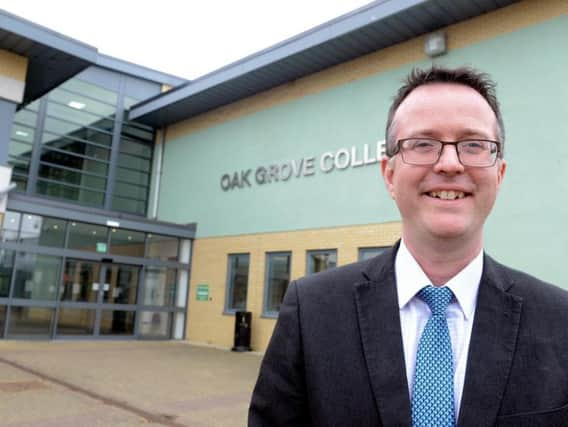Special school head warns of £220k budget short fall


The school, in The Boulevard, Worthing, is currently running at a £50,000 deficit – a figure that would have been three times higher but for the loss of six staff through voluntary redundancy.
And, with mainstream and special schools across the country crying out to the government for more money, head teacher Phillip Potter had a simple message for Damian Hinds, secretary of state for education.
Advertisement
Hide AdAdvertisement
Hide AdHe said: “Come and see us and come and sit down with me and help me plan my budget. That would be quite interesting.”


Special schools are not included in the government’s new National Funding Formula so will see none of the cash increase the formula may bring to mainstream schools. They will, however, continue to face increased costs in wages, pensions and National Insurance contributions, while relying on donations and goodwill to help keep them afloat.
For example, the school’s hugely successful production of Fame Jr, at the Connaught Theatre, was sponsored by a business, and their new outdoor science area was paid for by a charitable grant.
Mr Potter said: “That’s how we’re not crippled at the moment. That’s how we haven’t gone under at the moment. If we carry on with the kind of cost increases we’ve got, I will be crippled.
Advertisement
Hide AdAdvertisement
Hide Ad“Will the local authority grant me a £220,000 licensed deficit for next year? Because I tell you, I’m not prepared to get rid of 15 staff.”
The importance of having the right staff at a school like Oak Grove – which includes young people with complex medical needs – was one Mr Potter could not stress highly enough. As well as teachers and support staff, there are the likes of therapeutic staff, occupational therapists and physiotherapists.
It’s easy to see how education, health and social care all overlap in this one school. And it’s easy to see why the head is so vehement about not losing any more of his team.
Mr Potter laid out a horrifying concern which far outweighed any money issues, while simultaneously emphasising the need for more funds.
Advertisement
Hide AdAdvertisement
Hide AdHe said: “Fundamentally, if we get it wrong in this environment, somebody could die, because I’ve got those youngsters with complex medical needs.
“If we get it wrong with other young people here, it will be dangerous for them and for others.
“If we get it wrong for those youngsters who should be going out into the world of work, they won’t go out and be economically active.
“All three of those examples create other problems for society, that we can avoid now by investing in schools.”
Advertisement
Hide AdAdvertisement
Hide AdHe added: “It feels dramatic to say those things – but a few weeks ago my first duty call was to a young person who had stopped breathing after a fit as he was about to be hoisted into the pool. He’s fine now, absolutely fine, but that’s the realistic scenario that we have to deal with.”
As well as praising paramedics for their swift response to the boy’s plight, Mr Potter described his staff’s actions as “amazing”.
But incidents such as that – and others less dangerous – give the layman an idea of how a school such as Oak Grove differs from its mainstream cousins.
It’s a difference Mr Potter is not sure everyone, including some MPs, understand.
Advertisement
Hide AdAdvertisement
Hide AdHe said: “It’s only if you come into contact with the special schools that you actually genuinely understand the complexity of the work that we do.
“This is not an environment where we’re just looking after children. There are care needs, there are medical needs, there are therapeutic needs, but we are a learning environment and we have to make progress for all of our youngsters.
“It’s a mark of a civilised society, how you treat the most vulnerable people.”
The vulnerable youngsters at Oak Grove have been dealt what their head described as a ‘triple-whammy’: rising costs, no capital expenditure and a student population which has risen from 212 to 254 in six years.
Advertisement
Hide AdAdvertisement
Hide AdOn the positive side, they are surrounded by a group of adults who will do everything in their power to give them the help and education they need.
Mr Potter said: “I think the reason why things haven’t got serious is because I have a staff team who are dedicated to the young people they work with. Increasingly I’m asking them to do more and more with less and less. And they’re doing it because they care about the young people.”
How are our special schools funded?
High needs funding is allocated by central government to West Sussex County Council, which then distributes the money where needed.
In 2017/18, the council received £75.6m and recorded a high needs budget of £78.5m – a shortfall of £2,9m.
Of this, only £28.8m went to special schools.
Advertisement
Hide AdAdvertisement
Hide AdAs for the rest of the high needs budget, some £6m was spent on special support centres in mainstream schools and academies, a further £4.3m went to mainstream schools and academies without special support centres, £18.4m was spent placing children in independent and non-maintained schools, £7.5m was spent on alternative provision, including transport, £5.8m was spent on specialist support, £4.2m went on placements post-16, and £3.5m was spent on other support.
As with mainstream schools, the funding per pupil for children with special educational needs (SEN) is at the narrow end of the national wedge.
In a recent letter to parents, special school headteachers said West Sussex received an average of £19,447 per SEN pupil, compared to an average £23,406 per pupil nationally and an average £30,389 per pupil in London.
Until this year, money has been transferred from the council’s schools block to the high needs blocks to help cover the shortfall.
Advertisement
Hide AdAdvertisement
Hide AdThis year, however, with the 2018/19 budget expected to overspend by £4.3m, headteachers voted not to do so.
Their view was that all the transfer achieved was to mask how poorly funded special schools were – as well as putting additional pressure on the already cash-strapped mainstream schools.
The recommendation to transfer £2m to the high needs budget was rejected by members of the school forum in December, but was upheld by the secretary of state following an appeal by the council.